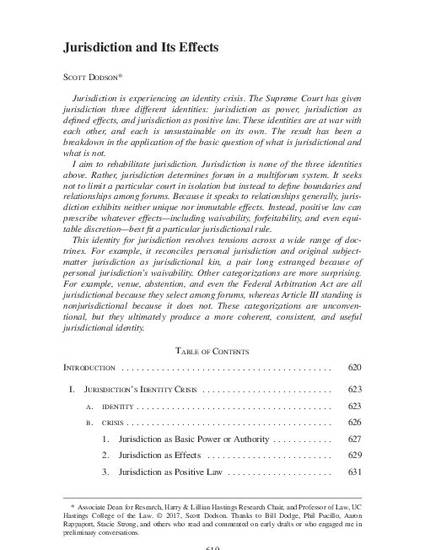
Article
Jurisdiction and Its Effects
105 Georgetown Law Journal 619
(2017)
Abstract
Jurisdiction is experiencing an identity crisis. The Court has given jurisdiction three different identities: jurisdiction as power, jurisdiction as defined effects, and jurisdiction as positive law. These identities are at war with each other, and each is unsustainable on its own. The result has been a breakdown in the application of the basic question of what is jurisdictional and what is not.
I aim to rehabilitate jurisdiction. Jurisdiction is none of the three identities above. Rather, jurisdiction determines forum in a multiforum system. It seeks not to limit a particular court in isolation but instead to define boundaries and relationships among forums. Because it speaks to relationships generally, jurisdiction exhibits neither unique nor immutable effects. Instead, positive law can prescribe whatever effects—including waivability, forfeitability, and even equitable discretion—best fit a particular jurisdictional rule.
This identity for jurisdiction resolves tensions across a wide range of doctrines. For example, it reconciles personal jurisdiction and original subject-matter jurisdiction as jurisdictional kin, a pair long estranged because of personal jurisdiction’s waivability. Other categorizations are more surprising. For example, venue, abstention, and even the Federal Arbitration Act are all jurisdictional because they select among forums, while Article III standing is nonjurisdictional because it does not. These categorizations are unconventional, but they ultimately produce a more coherent, consistent, and useful jurisdictional identity.
Keywords
- jurisdiction,
- subject-matter jurisdiction,
- article iii,
- standing,
- abstention,
- waiver,
- discretion
Disciplines
Publication Date
2017
Citation Information
105 Georgetown Law Journal 619 (2017)
